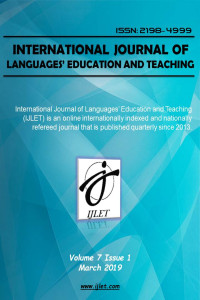Öz
This study aims to determine the factors affecting professional satisfaction of legal translators in the
Turkish Judiciary and to explore how professional satisfaction affects legal translators’ productivity.
The importance of professional satisfaction in work life of legal translators and the fact that there is
almost no study on this issue encourage the researchers to study on this topic. In this respect, the
study is a qualitative research where data was collected through an open-ended questionnaire and
face-to-face interviews with key persons. The result of the study revealed that among the factors
affecting professional satisfaction of legal translators are professional status, monthly wage, flexibility
of working hours and quality of legal texts in linguistic terms. Improvement in these factors may lead
legal translators to reach professional satisfaction and the quality of translations to be enhanced.
Anahtar Kelimeler
Legal translators Professional satisfaction Professional status monthly wage working hours.
Kaynakça
- Baş, T., Ardıç, K., 2002. Yüksek öğretimde iş tatmini ve tatminsizliği. İktisat İşletme ve Finans, Eylül, 17: 72-81.
- Cooper, Cary L., Rachel Davies, and Rosalie L. Tung. 1982. Interpreting stress: Sources of job stress among conference interpreters. Multilingua 1(2): 97–107. doi:10.1515/mult.1982.1.2.97
- Frey, B. S. & Stutzer A. (2002). Happiness and Economics. Princeton and Oxford: Princeton University Press.
- Metin-Tekin, B. & Işısağ, K. U. (2018). A comparative analysis of translation strategies in the turkish translation of songs in walt disney’s animated musical movies: ‘hercules’ and ‘frozen’. International Journal of Languages’ Education and Teaching, 5(1): 132-148. doi: 10.18298/ijlet.1662
Öz
Bu çalışma, Türk Yargı Sisteminde görevli hukuk çevirmenlerinin mesleki doyumlarını etkileyen
faktörlerin belirlenmesini ve mesleki doyumun iş verimini nasıl etkilediğini incelemeyi
amaçlamaktadır. Mesleki doyumun hukuk çevirmenlerinin çalışma hayatındaki önemi ve bu konuda
daha önce herhangi bir araştırma yapılmamış olması bu çalışmanın ortaya çıkmasına neden olmuştur.
Bu kapsamda nitel bir araştırma olan bu çalışmada, verilerin toplanması için açık uçlu sorulardan
oluşan bir anket ve yüz yüze görüşmeler gerçekleştirilmiştir. Çalışmanın sonucunda, hukuk
çevirmenlerinin mesleki doyumlarını etkileyen faktörler arasında mesleki statü, aylık kazanç, mesai
saatlerinin esnekliği ve işin niteliği gibi alt başlıkların öne çıktığı görülmüştür. Söz konusu faktörlerin
iyileştirilmesi çevirmenlerin mesleki doyuma erişmesine ve dolaylı olarak tercüme kalitesinin
artmasına yol açması beklenmekte.
Anahtar Kelimeler
Hukuk çevirmenleri mesleki doyum mesleki statü aylık kazanç mesai saatleri.
Kaynakça
- Baş, T., Ardıç, K., 2002. Yüksek öğretimde iş tatmini ve tatminsizliği. İktisat İşletme ve Finans, Eylül, 17: 72-81.
- Cooper, Cary L., Rachel Davies, and Rosalie L. Tung. 1982. Interpreting stress: Sources of job stress among conference interpreters. Multilingua 1(2): 97–107. doi:10.1515/mult.1982.1.2.97
- Frey, B. S. & Stutzer A. (2002). Happiness and Economics. Princeton and Oxford: Princeton University Press.
- Metin-Tekin, B. & Işısağ, K. U. (2018). A comparative analysis of translation strategies in the turkish translation of songs in walt disney’s animated musical movies: ‘hercules’ and ‘frozen’. International Journal of Languages’ Education and Teaching, 5(1): 132-148. doi: 10.18298/ijlet.1662
Ayrıntılar
| Birincil Dil | Türkçe |
|---|---|
| Konular | Çeviribilim |
| Bölüm | Araştırma Makalesi |
| Yazarlar | |
| Yayımlanma Tarihi | 30 Mart 2019 |
| Yayımlandığı Sayı | Yıl 2019 Cilt: 7 Sayı: 1 |

